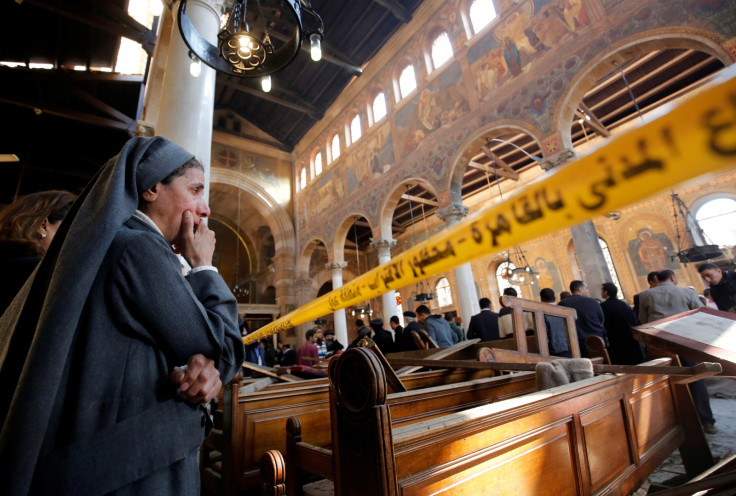Cairo bombing: Isis attacks all Egyptians and Islam when it strikes Coptic Christians
Sectarianism is a scourge and all must reject tolerating or using it for political ends.

One should make no mistake about the attack in Cairo against the Coptic Christian cathedral on the 11th of December: It was a sectarian attack of brutal proportions, and a particularly heinous one at that. Many of the dead and wounded women and children. The question of who the perpetrators are is a subject for a thorough investigation – but there are wider issues here that ought to have been addressed a long time ago.
The attack is an escalation of a truly repugnant trend. It has been years since such an attack on Coptic Christians took place. The last episode of this magnitude was in August 2013, when following the forced and violent dispersal of pro-Morsi sit-ins, 'reprisals' (as though Copts were responsible for the dispersal) against dozens of churches took place around the country.
But this is a particular type of obscenity. The attack targeted a church just adjacent to St Mark's Cathedral – Egypt's main Coptic Christian cathedral, killing at least 25 people and wounding at least another 49. This was an attack on civilians, Coptic Christian Egyptians and a symbol of Egyptian Coptic religion in particular.
But this attack did not come out of nowhere. There are two issues that have to be raised when it comes to sectarianism against Coptic Christians in Egyptians. The first relates to the many complaints that Coptic Christian organisations have been raising over not just recently, but many years. The underlying claim is common – that too many in the country do not take seriously enough the issue of sectarianism. It goes someway to understanding why, in the immediate aftermath of the bombing, the Guardian reported that angry Copts at the scene were chanting slogans against the authorities, feeling they were unprotected.
The second issue relates to some parts of the Islamist opposition to the authorities. All too often, analysts and commentators run the risk of insisting that all Islamists are either terrorists akin to al-Qaeda or Islamic State (Isis), or that they are the Arab-Muslim versions of the Christian Democrats. It's a false binary from the get-go. The choice isn't between these two options, because there are genuinely many shades in between.
Rejecting the label of 'terrorist' or even 'violent' upon all Islamists is a legitimate and appropriate analytical conclusion. But that doesn't mean that all those who do not come under the label of 'terrorist' are unproblematic.
Isis declared themselves, yet again, outside of mainstream Sunnism
Many within the Islamist camp do indeed support sectarian incitement against Christians and many other groups (including mainstream Sunni Muslims). Many provide platforms for that kind of incitement, and are not bashful about it – but because it invariably happens in Arabic, rather than in English, it is often left ignored.
It is difficult to make this kind of analytical point, because all too often, historically, non-violent Islamists have often been treated badly and with unwarrantable measures. To critique groups that are suffering from the brunt of crackdowns is a delicate ethical issue indeed – but it must be done. It must be done surgically and without allowing for the critique to embolden unjustified acts – but it must be done.
Otherwise, we fall into the unenviable trap of sugarcoating the sectarianism incitement of certain Islamist groups, just because they are not violent or radically extreme. But sectarian incitement doesn't simply stop at words – it can easily be translated into devastating action.
IS, radical Islamists per excellence, reportedly claimed the attack late Tuesday. As they did, they declared themselves, yet again, outside of mainstream Sunnism in a rather profound fashion. It wouldn't be the first time that they or radical Islamists did so. Vigilante violence; the wanton killing of civilians, the destroying of churches, the targeting of the Christian community – the religious establishments of mainstream Islam quickly reiterated that all of these go against religious teachings.
But there is one more aspect to this attack that makes it more significant. Sunday was the official Egyptian holiday for marking the birth of the Prophet Muhammad. Celebrating his birth is a recognised practice of mainstream Sunni Muslims worldwide – radicals informed by strains of purist and heterodox notions of religion, on the other hand, would reject the practice as evidence of 'deviation' at best, and heresy at worst. Yet, by perpetrating such an action especially on this day, though any day would have been appalling, they have only proven, yet again, their own deviation.
Those who carried out the attack on Sunday attacked more than the symbol of Egyptian Christianity. They attacked Egyptians, and Islam alongside them. Sectarian incitement, and the violence it informs, is a scourge – and all must take seriously, and reject the cynicism of tolerating, or even using it, for political ends.
Dr H. A. Hellyer is a senior non-resident fellow at the Atlantic Council and the Royal United Services Institute in London, author of 'A Revolution Undone'
© Copyright IBTimes 2025. All rights reserved.




















